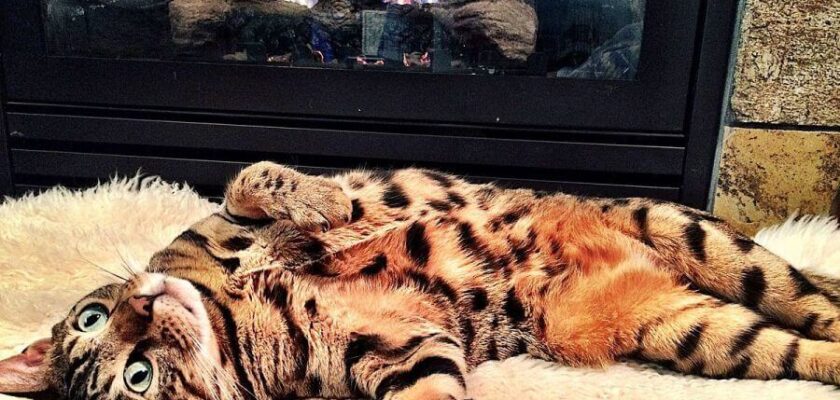Cheetoh Breed: Basic Information
The Cheetoh is a relatively new breed of cat that was developed in the early 21st century. It is a cross between the Bengal and the Ocicat, two breeds with distinctively spotted coats. The resulting offspring are typically larger than either parent, with long, muscular bodies and short, dense fur.
Cheetoh Breed History
The Cheetoh was created by crossing two existing breeds: the Bengal and the Ocicat by Carol Drymon, who wanted to create a cat breed that would be exotic in appearance and affectionate. The resulting offspring inherits the best features of both parent breeds, including the spotted coat of the Bengal and the athletic build of the Ocicat. However, the Cheetoh also has some unique physical traits, such as longer legs and a more slender build.
Cheetoh Breed Appearance
As their name suggests, they are characterized by their spotted coats. Cheetohs are generally larger than other domestic cats, with males typically weighing between 15 and 25 pounds. The head is round, with large ears and almond-shaped eyes. The coat is short and dense, with large spots that can be either black or brown. Cheetohs are also known for their “ticked” coats, which means that each individual hair has multiple colors. While the Cheetoh is still a relatively rare breed, it is becoming more popular due in part to its unique appearance.
Cheetoh: Grooming and Maintenance
One important consideration for anyone thinking about getting a Cheetoh cat is the amount of time and effort required for grooming and maintenance. These cats have very short, fine fur that requires regular but not often brushing to avoid matting. These cats are known for being independent and self-sufficient, and they generally don’t require a lot of attention or care. They’re also relatively low-shedding, so you won’t have to spend much time grooming them.
Cheetoh: Activity Level
The Cheetoh is a very active cat, always on the move and ready to play. They love to explore and are often the first to find anything new in their environment. This can sometimes get them into trouble, but they’re always up for a good time. When it comes to playing, they are full of energy and love to run and chase. They are also very agile, making them excellent jumpers.
Training
Though they may look wild, Cheetohs are actually very affectionate and make great companion animals. They are also relatively easy to train. When it comes to training, Cheetohs are intelligent and eager to please, so positive reinforcement is often the most effective approach. However, they can also be stubborn at times, so patience and consistency are important.
Cheetoh Breed Personality Traits
This cat loves to play and be around people, making it one of the most social breeds. They do not only form strong bonds with their owners, but also with other pets and animals in the home. Cheetoh cats crave attention and will often follow their owners around, meowing to get noticed. They’re very social and love to be around people that they do not know.
Cheetoh: Common Health Problems
Cheetoh usually live 10 to 15 years, but since they’re a crossbreed, they may inherit health problems from either parent – the Bengal or the Ocicat. Cheetoh may be prone to gingivitis, which is a gum disease that can lead to tooth loss if not treated early. Cheetohs are also at risk of developing Feline Infectious Peritonitis (FIP), a potentially fatal viral disease.
As with any pet, be sure to take your Cheetoh to the vet regularly and keep up with their vaccinations. An annual check-up is recommended.
Cheetoh: Price
While it is not yet recognized by any major cat fancy organizations, the Cheetoh is gaining popularity due to its unique appearance and friendly temperament. On average, Cheetoh kittens cost between $500 and $1,500. Because the Cheetoh is still a relatively rare breed, demand often outstrips supply, so prices may vary depending on the availability of kittens. Prospective owners should also be prepared to pay for ongoing care, including regular vet checkups and vaccinations. With proper care, a Cheetoh can make a loyal and loving companion for life.
Cheetoh: For Whom?
Thanks to its wild appearance, the Cheetoh is sure to be a conversation starter. But be warned – this cat is not for everyone. With its high energy level and need for mental stimulation, the Cheetoh requires an owner who is willing to provide plenty of playtime and enrichment activities. Their social nature also means that they do not adapt well to living alone, so if you are looking for an independent pet, the Cheetoh may not be the right choice.
Similar Posts:
- Exotic Cat Breeds: Small Exotic Cats and Cats Legal to Keep as Pets
- Bengal Cat Breed: Facts About Beautiful Bengals
- Smart Cat Breeds: Top 10 Smartest Cat Breeds in the World
- The Most Beautiful Brown Cat Breeds: From the York Chocolate to the Havana Brown Cat
- The Ocicat Cat Breed: An All-Domestic Cat with Ocelot-Like Spots
- 11 Most Popular and Gorgeous Gray and White Cat Breeds
- Black Cat Breeds. We Created a List of the Most Beautiful Black Breeds With Some Fun Cat Facts About Them
- What Are The Most Expensive Cat Breeds in the World? Here’s a List

